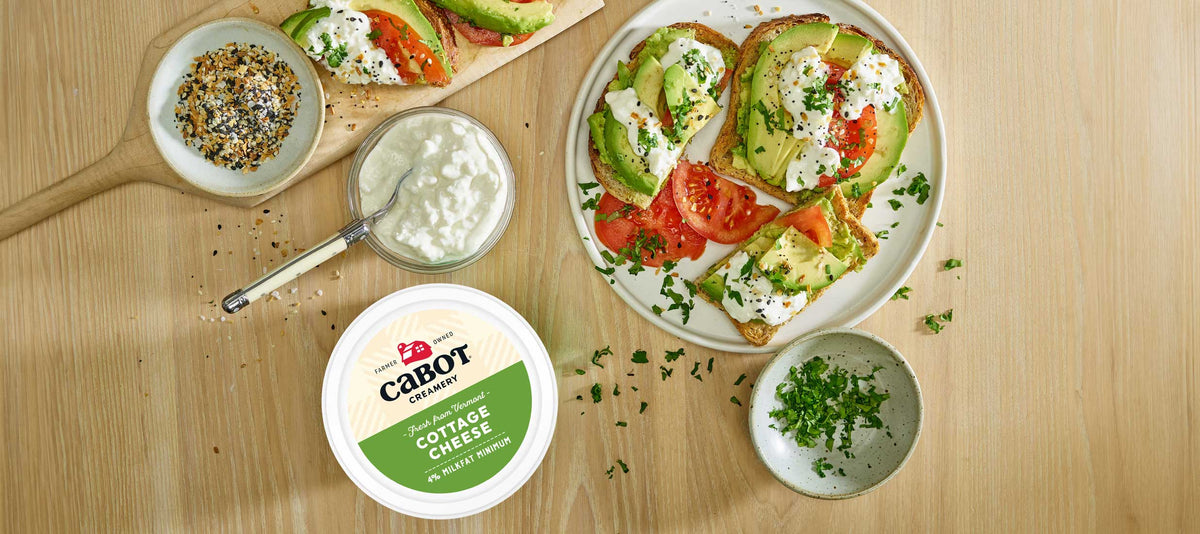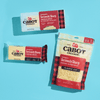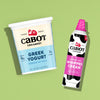
Cottage Cheese – Is It Good For You?
When it comes to getting your daily servings of dairy, your options go well beyond milk, cheese and yogurt.
Cottage cheese is a classic option that’s making a big comeback as an entree, side dish and an add-in for smoothies, dips, breakfast bowls, fruit salads and more. But is cottage cheese good for you? The short answer is: yes. The protein content and complete package of nutrition make cottage cheese as nutritious as it is tasty. Read on for the full scoop about cottage cheese nutrition and to discover new ways to enjoy it.
What Is Cottage Cheese?
Cottage cheese is technically classified as a fresh cheese, meaning that it isn’t aged or ripened to enhance its flavor. The production process gives cottage cheese a much milder flavor than cheddar, Gouda, Parmesan, brie and Camembert. You can easily recognize it for its white color and soft, creamy texture.
Traditional cottage cheese is made from whole milk, but it can also be made from 1%, 2% or skim milk to create reduced-fat or nonfat cottage cheese. To suit a wide range of dietary needs, cottage cheese also comes in lactose-free, reduced sodium and sodium-free varieties. Creamed and whipped varieties allow you to enjoy all the taste and nutritional benefits of cottage cheese with a slightly different texture. Another difference between cottage cheese products is curd size. You can choose from small, medium or large curds to suit your preferences.
How Is Cottage Cheese Made?
Cottage cheese production is a straightforward, simple process. To start, an acidic substance like lime juice or vinegar goes into warm milk to start a curdling process. The acid increases the pH of the milk, causing curds of casein protein to separate from the liquid part of milk known as whey.
After the solid curds form, the batch of cottage cheese gets cut into smaller pieces and cooked more to release moisture. A washing and draining process then reduces the acidity and eliminates excess moisture. What you’re left with is a sweet curd that crumbles easily to give cottage cheese its classic texture. To finish up, cream, salt, herbs and spices may be added to complement the natural flavors of the fresh cheese.
Cottage Cheese Benefits and Nutrition
Cottage cheese is a true protein powerhouse with protein accounting for about 70% of the calories. In one cup of 2% milk fat cottage cheese, there are 194 calories, 5.5 grams of fat and 26.7 grams of protein. Comparatively, carbs in cottage cheese are very low with only 8.3 grams in a 1-cup serving of 2% cottage cheese.
Overall, the nutritional values of cottage cheese depend on the amount of sodium and milk fat in the product. In terms of a 2,000-calorie diet, a single serving of
Cabot’s Cottage Cheese contains:
- 100 calories with 40 calories from fat
- 5 grams of total fat, which is 7% of the daily value
- 3 grams of saturated fat, which is 15% of the daily value
- 0 grams of trans fat
- 15 milligrams of cholesterol, which is 5% of the daily value
- 400 grams of sodium, which is 17% of the daily value
- 0 grams of dietary fiber
- 4 grams of sugars
- 11 grams of protein
- 6% of the daily allowance of vitamin A
- 20% of the daily allowance of vitamin D
- 10% of the daily allowance of calcium
In addition to the above nutrients, cottage cheese is rich in vitamin B12, selenium and some other vitamins and minerals.
So… Is Cottage Cheese Actually Good for You?
Cottage cheese does contain beneficial protein, vitamins and minerals, and researchers from around the world have studied its potential health benefits. One conducted in France concluded that cottage cheese may help reduce blood sugar levels after eating to potentially benefit people with diabetes.
A 2012 Polish study demonstrated the benefits of adding cottage cheese to a weight loss diet. It followed 60 men and women who had a desire to lose weight. The groups were given a healthy eating plan to follow that included cottage cheese and other foods. At the end of the one-year study, the participants lost weight and saw reductions in their LDL cholesterol, triglyceride and blood pressure levels.
Scientific studies also illustrate the potential benefits of cottage cheese for those following high-protein diets for weight loss or muscle building. A 2011 study found that casein protein, a main form of protein in cottage cheese, helped reduce hunger more than whey protein supplements, and one published in 2016 revealed that casein protein increased the production of the building blocks of muscle tissue after workouts.
How To Incorporate More Cottage Cheese Into Your Diet
There are many delicious ways that you can work cottage cheese into your diet. You can:
- Add it to waffle and pancake batter
- Mix it into pasta sauces in place of cream to create dishes like Spaghetti & Zucchini in Creamy Parmesan Sauce
- Substitute it for ricotta or sour cream. Use cottage cheese as a layer in your next lasagna or top off baked potatoes with a scoop
- Serve it in salad. Swap the cheddar in a Beet and Orange Salad with cottage cheese for a creamy new take, or use it as the base for a fruit salad made with whatever is in season like peaches, bananas, berries and melon chunks
- Use it in place of milk in dipping sauces
- Blend it into smoothies and shakes to add body
- Spread it on toast like these High Protein Cottage Cheese Pizza Toasts
- Mix it into baked goods like muffins, cakes or bread
- Make it the star of your meal with recipes like Baked Cottage Cheese; Chive, Cheddar & Green Chili Corn Mini-Quiches, Mac and Cheese and Skinny Zucchini Casserole
- Top off sandwiches and burgers with it instead of mayo
- Stir it into scrambled eggs for added creaminess
Cottage cheese can complement eating plans for a variety of goals from increasing protein intake to weight loss. Its versatility means you can enjoy a seemingly endless number of ways to get some of your daily calcium, vitamin D, vitamin A, vitamin B12, selenium and other nutrients.














